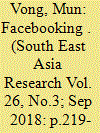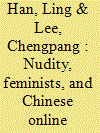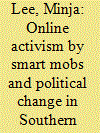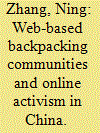| Srl | Item |
| 1 |
ID:
161649


|
|
|
|
|
| Summary/Abstract |
This article takes a critical view of online activism as its point of departure and explores how the activities of Cambodian youth on Facebook have spilled over into formal politics. Contrary to concerns that Facebook and other social media tools distract activists from more effective means of political participation, this article suggests that facebooking has contributed positively to offline political participation. More importantly, the petty acts of discussing and sharing information on Facebook have, on occasion, succeeded in triggering changes in government decisions and behaviours. In developing these arguments, we draw upon everyday politics perspectives which provide the theoretical ground to qualify facebooking as political and make sense of its importance.
|
|
|
|
|
|
|
|
|
|
|
|
|
|
|
|
| 2 |
ID:
170188


|
|
|
|
|
| Summary/Abstract |
Chinese feminist activists are actively participating in the Chinese online public sphere. In this study, we examine a case – the Anti-Domestic Violence with Nude Photos Campaign (裸照反家暴活动) – and the response of Chinese online censorship to this campaign. Campaign activists used nude photos to mobilize the public’s support. According to the existing theoretical perspectives such as the collective action potential theory, this kind of online campaign with pornographic elements and the potential to mobilize people is very likely to be censored. Counter to this expectation, we found that not all of the original photos were removed. Our finding suggests that the interactive manner in which activists responded to the public on SinaWeibo’s discussion threads matters in terms of the degree of censorship. This study complements the existing studies on the Chinese online censorship system, echoes scholars’ call for studies on censorship from a more interactive angle, and furthers our understanding of the Chinese feminist movement.
|
|
|
|
|
|
|
|
|
|
|
|
|
|
|
|
| 3 |
ID:
118511


|
|
|
| 4 |
ID:
133734


|
|
|
|
|
| Publication |
2014.
|
| Summary/Abstract |
This article examines activism that has emerged in online communities. This ethnographic study of two web-based backpacking communities shows that citizens and activists use the Internet mainly for forming communities, sharing information, instilling democratic values and solving immediate social problems. They do not call for cyberwar, acts of hacktivism or other sorts of offensive online and offline actions, but seek to bring social justice and improve well-being within their sphere of influence. The dynamics of this new online activism and its significance for the development of associational life and civil society in China are explored in this article.
|
|
|
|
|
|
|
|
|
|
|
|
|
|
|
|